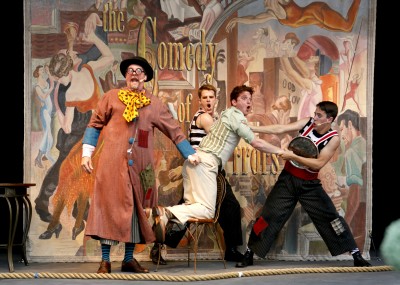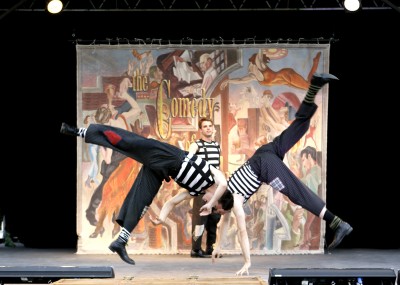The Comedy of Errors
Directed & Adapted by David H. Bell
Presented by Chicago Shakespeare Theater
Playing Free in 18 Citywide Parks
Critics and scholars have long considered Shakespeare’s The Comedy of Errors to be his ‘lightest’ play. Of all his comedies, it’s the one that most closely resembles farce, the sole purpose of which is to make us laugh—a task no doubt easier said than done.
Chicago Shakespeare Theater’s current production, being performed for free throughout the city’s neighborhood parks as part of this summer’s Chicago Shakespeare in the Parks, thankfully fulfills our expectations. This rapid-fire 75-minute adaptation by Jeff Award-winning director David H. Bell eschews too ponderous a conceptual approach in favor of a boisterous and slapstick romp, replete with wild acrobatics, juggling and light-hearted sight gags.
Comedy of Errors—thought by some to be Shakespeare’s first play—adheres to the received models passed down from ancient Roman comedy. Loosely adapted from the Plautus’s Menaechmi, Shakespeare’s version tells the story of Antipholus of Syracuse and his manservant Dromio who together arrive in the city of Ephesus in search of their long lost twins (yes, they each have one).
 Separated when they were only infants aboard a doomed vessel at sea, the arrival of the Antipholusian (?) set sends the sordid people of Ephesus into a tailspin. Instances of mistaken identities abound, compounding one onto the next, as wives mistake strangers for their husbands, goldsmiths surrender their goods without hope of repayment, and kitchen wenches, well, do what kitchen wenches do, I guess.
Separated when they were only infants aboard a doomed vessel at sea, the arrival of the Antipholusian (?) set sends the sordid people of Ephesus into a tailspin. Instances of mistaken identities abound, compounding one onto the next, as wives mistake strangers for their husbands, goldsmiths surrender their goods without hope of repayment, and kitchen wenches, well, do what kitchen wenches do, I guess.
Still, Comedy of Errors isn’t quite as mindless as it might look, and there’s a subtle psychoanalytical (even metaphysical) conceit being played out here as Antipholus of Syracuse travels to strange lands in search of his proverbial ‘other half.’ Undergirding the show is a longing for reunion and a need to repair one’s fractured family—themes Shakespeare would come full circle to again later in his career with such plays as The Winter’s Tale and The Tempest. Those inclined to peer deeper into The Comedy are invited to do so, and not without just reward.
But for Bell, these sort of overly cerebral considerations are done away with in favor of a more carefree comedic indulgence. Which is not to say that it isn’t thinking. Framed as a play within a play, the actors onstage are meant to be a ragtag troupe of wandering vaudevillians, granted an opportunity by FDR’s Federal Theater Project to put on a show. Originally slated to do Shakespeare’s Timon of Athens, ‘missing’ cast members force them to move to Plan B. And then Plan C. And then finally Plan D. The device is remarkably effective, imbuing the whole of the production with a delightfully controlled impromptu chaos. Despite the intricate precision employed throughout in executing its many rough and tumbles, the show never feels wooden, stiff or overly plodding. To its immense credit, we buy the ‘spontaneity’ of its premise through and through.
Plus the references to FDR’s Federal Theater Project help set just the right tone for this free public outing, brought to us by collaboration with the  Chicago Park District. Though a far cry from the Great Depression’s Federal One Project (the aerospace defense contractor Boeing is also a sponsor), its important for individuals to recognize when their public institutions take part in creating worthwhile cultural events. With near everything else currently up for austerity budget cuts, Bell’s subtle invocation of the New Deal ethos may be just what Chicagoans need in order to reconsider what ‘Big Government’ has to offer—if only it had the political will. Still, it’s significant that Bell leaves the politics to the periphery of his framing device, allowing his audience to revel in the madcap zaniness of Shakespeare’s comedy while never forgetting the very real socio-political contexts which make it all possible.
Chicago Park District. Though a far cry from the Great Depression’s Federal One Project (the aerospace defense contractor Boeing is also a sponsor), its important for individuals to recognize when their public institutions take part in creating worthwhile cultural events. With near everything else currently up for austerity budget cuts, Bell’s subtle invocation of the New Deal ethos may be just what Chicagoans need in order to reconsider what ‘Big Government’ has to offer—if only it had the political will. Still, it’s significant that Bell leaves the politics to the periphery of his framing device, allowing his audience to revel in the madcap zaniness of Shakespeare’s comedy while never forgetting the very real socio-political contexts which make it all possible.
RECOMMENDED
Reviewed by Anthony Mangini
Reviewed on Sunday, July 28th, 2013
Running time is 1 hour and 15 minutes with no intermission.
The Comedy of Errors runs until August 25th, 2013. Admission is free.
